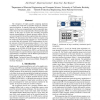Free Online Productivity Tools
i2Speak
i2Symbol
i2OCR
iTex2Img
iWeb2Print
iWeb2Shot
i2Type
iPdf2Split
iPdf2Merge
i2Bopomofo
i2Arabic
i2Style
i2Image
i2PDF
iLatex2Rtf
Sci2ools
INTERSPEECH
2010
2010
Exploring recognition network representations for efficient speech inference on highly parallel platforms
The emergence of highly parallel computing platforms is enabling new trade-offs in algorithm design for automatic speech recognition. It naturally motivates the following investigation: do the most computationally efficient sequential algorithms lead to the most computationally efficient parallel algorithms? In this paper we explore two contending recognition network representations for speech inference engines: the linear lexical model (LLM) and the weighted finite state transducer (WFST). We demonstrate that while an inference engine using the simpler LLM representation evaluates 22
Inference Engine | INTERSPEECH 2010 | LLM Representation | Signal Processing | Speech Inference Engine |
| Added | 18 May 2011 |
| Updated | 18 May 2011 |
| Type | Journal |
| Year | 2010 |
| Where | INTERSPEECH |
| Authors | Jike Chong, Ekaterina Gonina, Kisun You, Kurt Keutzer |
Comments (0)

